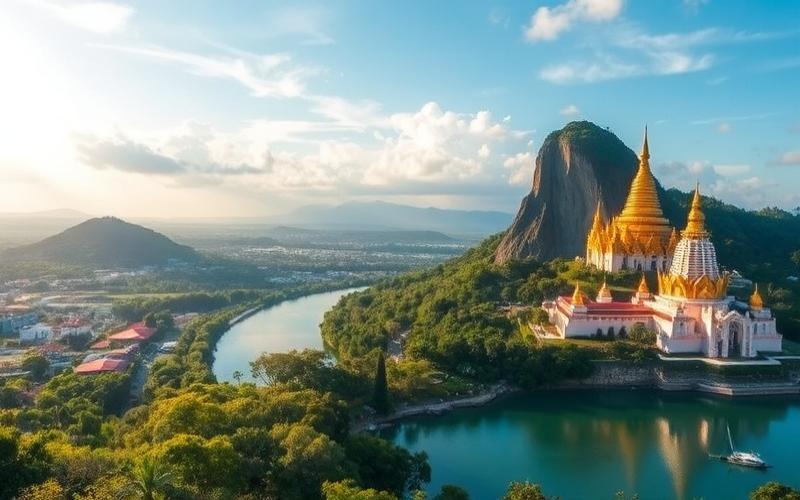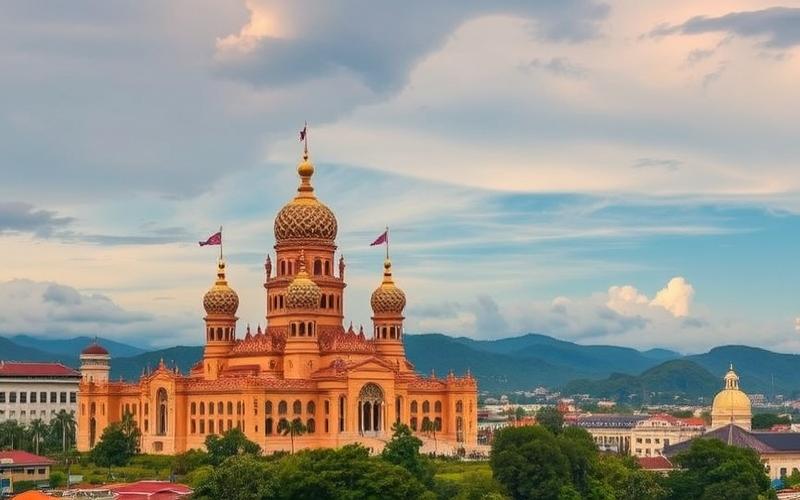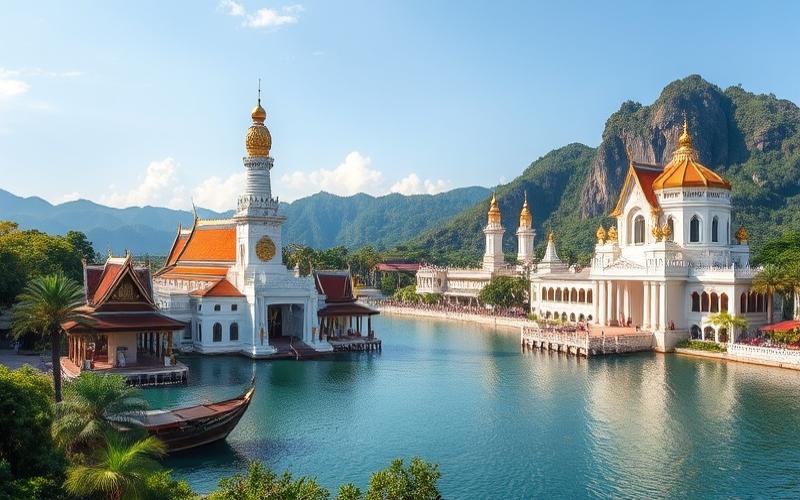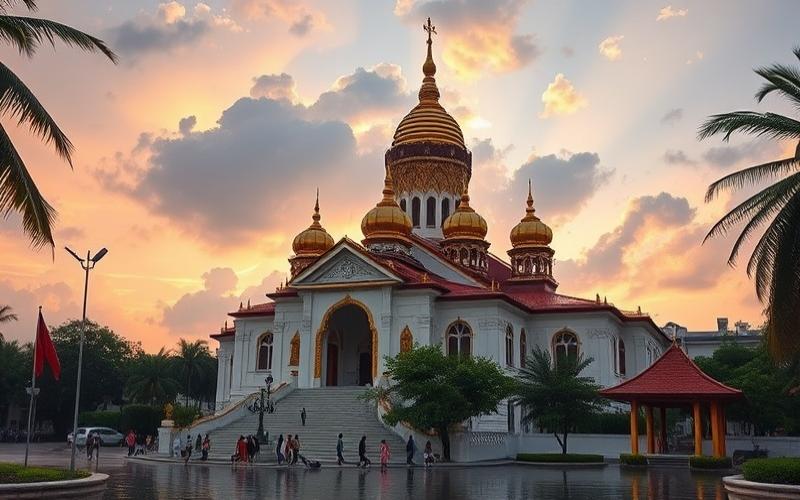
 Published on and written by Cyril Jarnias
Published on and written by Cyril Jarnias
Brunei, a small sultanate nestled on the island of Borneo, is increasingly attracting the attention of international real estate investors. With its stable economy, favorable tax system, and luxurious living environment, this country offers enticing opportunities in the real estate sector. However, as with any foreign investment, it is crucial to prepare well and avoid certain common mistakes that could turn your investment dream into a financial nightmare. In this article, we will explore the main pitfalls to avoid when purchasing property in Brunei, enabling you to make a wise and profitable investment.
Not Understanding Restrictions for Foreigners: A Major Hurdle to Overcome
One of the most frequent and potentially costly mistakes for foreign investors in Brunei is failing to properly grasp the legal restrictions that apply to them. Unlike many countries where purchasing real estate by foreigners is relatively straightforward, Brunei imposes strict rules that can surprise uninformed investors.
In Brunei, foreigners cannot purchase land with full ownership rights. This restriction is fundamental and often misunderstood by newcomers to the local real estate market. Non-citizens are limited to purchasing strata-titled properties or long-term land leases. Ignoring this rule can lead to investments that cannot be finalized or significant legal complications.
Furthermore, even for strata-titled properties, there are limitations. Foreigners can generally only purchase in designated areas, often luxury residential developments or specific commercial zones. Purchasing outside these areas may prove impossible or require special permits that are difficult to obtain.
It is also crucial to understand that certain types of properties, such as traditional Malay houses or historical properties, are generally off-limits to foreign buyers. Attempting to acquire such properties without knowing these restrictions can lead to significant loss of time and money.
To avoid these pitfalls, it is essential to work with a local lawyer specializing in real estate law and a real estate agent experienced in transactions with international clients. These professionals can guide you through the maze of local regulations and help you identify legally accessible investment opportunities.
Good to Know:
In Brunei, foreigners are limited to purchasing strata-titled properties or long-term land leases in designated areas. Prior consultation with local experts is essential to navigate these restrictions.
Underestimating the Importance of Due Diligence: A Negligence with Serious Consequences
Another common mistake made by foreign investors in Brunei is underestimating the importance of due diligence in the property purchasing process. This crucial step is often overlooked or rushed, which can lead to unpleasant surprises after acquisition.
Due diligence in Brunei involves a thorough verification of several aspects of the property:
- The legal status of the property
- History of property titles
- Any existing easements or encumbrances on the property
- Compliance of the property with local construction and zoning regulations
- Physical condition of the property and any necessary repairs
Neglecting these checks can have serious consequences. For example, it’s not uncommon in Brunei for properties to have unresolved title issues, ongoing disputes, or undisclosed usage restrictions. Without proper due diligence, a buyer could end up owning a property they cannot use as intended or that requires significant additional investment to meet local standards.
Furthermore, the property registration system in Brunei can be complex for foreigners. It is crucial to verify that all documents are in order and that the seller actually has the right to sell the property. Cases of real estate fraud, although rare, do exist, and thorough due diligence is your best protection against such risks.
To conduct effective due diligence, it is recommended to engage experienced local professionals. A lawyer specializing in real estate law can perform the necessary legal checks, while a building expert can assess the physical condition of the property. Although these services represent an additional cost, they constitute a wise investment to avoid potentially much more expensive problems in the future.
Good to Know:
Due diligence is a crucial step when purchasing property in Brunei. It should cover legal, regulatory, and physical aspects of the property. Engaging local professionals for this step is a wise investment to secure your purchase.
Ignoring Local Market Specifics: A Costly Mistake
A common mistake made by foreign investors in Brunei is not sufficiently considering the specific characteristics of the local real estate market. Many arrive with expectations based on their experience in other countries, without realizing that the Bruneian market has its own particularities that can greatly influence the value and profitability of an investment.
Brunei’s real estate market is relatively small and can be less liquid than that of larger countries. This means that reselling a property may take longer than anticipated, especially for luxury or highly specific properties. Investors who don’t account for this reality may find themselves with assets that are difficult to liquidate when needed.
Furthermore, price dynamics in Brunei can be different from what foreign investors are used to. Although the country enjoys overall economic stability, the real estate market is not immune to fluctuations. Prices can vary considerably depending on local factors such as new government developments, changes in economic policies, or demographic trends.
Another often overlooked aspect is the importance of location in Brunei. In this small country, a property’s value can change drastically depending on its proximity to certain points of interest, commercial areas, or government infrastructure. For example, properties near the capital, Bandar Seri Begawan, or in economic development zones like Jerudong, may have very different appreciation prospects than those in more remote areas.
It is also crucial to understand the preferences and habits of the local market. For example, traditional Malay houses may have significant cultural value for locals but may be less attractive to the international rental market. Conversely, certain types of modern properties may be highly sought after by expatriates but less so by the local population.
To avoid these pitfalls, it is essential to conduct thorough market research before any investment. This involves:
- Analyzing price trends over several years
- Studying future development projects that could affect property values
- Understanding the preferences of different market segments (locals, expatriates, investors)
- Consulting experienced local real estate agents for market insights
By taking the time to properly understand these specifics, you will be better equipped to make a wise investment choice suited to the local context in Brunei.
Good to Know:
Brunei’s real estate market has its own particularities, especially in terms of liquidity, price dynamics, and importance of location. Thorough market research and consultation with local experts are essential for making an informed investment.
Neglecting Tax and Financial Aspects: A Potentially Costly Oversight
A common but potentially very costly mistake for foreign investors in Brunei is neglecting the tax and financial aspects related to purchasing and holding real estate in the country. Although Brunei is known for its favorable tax regime, there are nevertheless important considerations to take into account.
Unlike many countries, Brunei does not impose personal income tax or capital gains tax on real estate. This particularity attracts many foreign investors. However, it would be mistaken to think there are no tax implications when purchasing property in the country.
First, it’s important to understand that even though Brunei doesn’t directly tax rental income or capital gains, your home country might. Foreign investors must therefore be aware of the tax implications in their country of tax residence. Ignoring this aspect can lead to double taxation issues or incorrect tax filings, potentially resulting in penalties.
Furthermore, although there is no income tax, there are other fees to consider:
- Property transfer fees: Typically around 1% of the property value
- Registration fees: Vary depending on the type and value of the property
- Notary fees: For preparing and authenticating legal documents
- Real estate agent fees: Typically between 2% and 5% of the sale price
These fees, although relatively modest compared to other countries, can nevertheless represent a significant amount, especially for luxury properties.
Another often overlooked aspect is the question of financing. Local banks in Brunei may be reluctant to grant mortgages to foreigners, or do so under less favorable conditions than for local residents. Investors who rely on local financing without having explored this issue in advance may find themselves in a difficult situation, unable to finalize their purchase or forced to accept unfavorable financing terms.
It is also crucial to understand the long-term tax and financial implications of holding property in Brunei. For example, although there is no annual property tax per se, there may be maintenance fees for strata-titled properties or local charges for certain municipal services.
To effectively navigate these complex waters, it is strongly recommended to consult:
- An international tax advisor familiar with the tax laws of your home country and those of Brunei
- A local lawyer specializing in real estate law to understand all legal and financial implications
- A financial advisor to explore the most suitable financing options for your situation
By considering these tax and financial aspects from the beginning of your investment project, you will avoid unpleasant surprises and be better able to plan your long-term investment strategy in Brunei.
Good to Know:
Although Brunei’s tax regime is favorable, it is essential to consider tax implications in your home country, fees associated with purchase, and potential financing challenges. Consultation with tax and financial experts is crucial to optimize your investment.
Underestimating the Importance of Cultural Relations: A Subtle but Significant Mistake
A mistake often underestimated by foreign investors in Brunei is neglecting the importance of cultural relations and local business practices. Brunei, with its rich Malay and Islamic culture, has social codes and business practices that can be very different from those Western investors are accustomed to. Not taking these cultural aspects into account can not only complicate real estate transactions but also affect the value and long-term management of your investment.
In Brunei, personal relationships and trust play a crucial role in business, including real estate. Unlike some Western markets where transactions can be purely transactional, in Brunei, taking time to build relationships is often essential to successful negotiation or obtaining the best investment opportunities.
For example, it’s not uncommon for the best real estate offers not to be publicly announced but shared through personal networks. Investors who don’t take the time to develop these relationships may miss out on interesting opportunities.
Furthermore, the way of communicating and negotiating can be very different from what foreign investors are used to. Bruneian culture emphasizes politeness, respect, and harmony in interactions. An approach that is too direct or aggressive in negotiations, which might be considered normal in some Western countries, can be perceived as offensive in Brunei and compromise a potentially advantageous transaction.
It is also important to understand and respect local religious practices. Brunei is a conservative Muslim country, and this influences many aspects of daily life and business. For example, work schedules may be adjusted during Ramadan, and certain times of the year may be less conducive to commercial transactions due to religious holidays.
Another cultural aspect to consider is the perception of property and space. In Malay culture, the concept of ownership can be more fluid and community-oriented than in some Western cultures. This can affect how properties are used, maintained, or even valued. For example, common spaces or shared areas may have particular importance in a residential complex, thus influencing the value and appeal of individual properties.
To effectively navigate this cultural landscape, here are some recommendations:
- Invest time in understanding the culture and business etiquette in Brunei
- Work with trusted local intermediaries who can guide you through cultural subtleties
- Be patient in your negotiations and business interactions
- Show respect for local religious and cultural practices
- Learn a few basic phrases in Malay to show your interest and respect for the local culture
By taking the time to understand and respect these cultural aspects, you will not only facilitate your real estate transactions but also establish long-term relationships that will benefit your future investments in Brunei.
Good to Know:
Understanding and respecting local cultural norms and business practices are essential for success in real estate in Brunei. Investing time in building relationships and learning about the local culture can open doors and create unique opportunities.
Investing in real estate in Brunei can be an exciting and potentially lucrative opportunity for foreign investors. However, as we have seen, there are several pitfalls to avoid to ensure your investment is successful.
In summary, the main mistakes to avoid are:
- Not understanding legal restrictions for foreign buyers
- Underestimating the importance of due diligence
- Ignoring local market specifics
- Neglecting tax and financial aspects
- Underestimating the importance of cultural relations
The key to success in real estate in Brunei lies in meticulous preparation, thorough understanding of the local market, and the ability to adapt to the country’s business and cultural practices. By avoiding these common mistakes and adopting a thoughtful and respectful approach, you will significantly increase your chances of making a successful real estate investment in this unique and promising market.
Remember that foreign real estate investment is a complex process that requires patience, diligence, and often the help of experienced local professionals. Take the time to inform yourself properly, build a reliable local network, and approach each opportunity with a mix of caution and open-mindedness.
Ultimately, investing in Brunei can not only be financially rewarding but also a personally and culturally enriching experience. With the right approach and a deep understanding of the challenges and opportunities, you will be well positioned to make the most of your real estate investment in this fascinating Southeast Asian country.
Good to Know:
Success in real estate in Brunei requires a comprehensive approach that takes into account legal, financial, cultural, and practical aspects. Meticulous preparation and the help of local professionals are essential to successfully navigate this unique market.
Disclaimer: The information provided on this website is for informational purposes only and does not constitute financial, legal, or professional advice. We encourage you to consult qualified experts before making any investment, real estate, or expatriation decisions. Although we strive to maintain up-to-date and accurate information, we do not guarantee the completeness, accuracy, or timeliness of the proposed content. As investment and expatriation involve risks, we disclaim any liability for potential losses or damages arising from the use of this site. Your use of this site confirms your acceptance of these terms and your understanding of the associated risks.




















